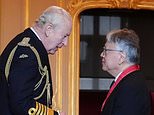In a significant engagement at Windsor Castle on November 5, 2025, King Charles III voiced his support for acclaimed author Sir Kazuo Ishiguro as they discussed the challenges posed by artificial intelligence (AI) to the creative industries. The King emphasized the need for ongoing resistance against the exploitation of artistic works by technology companies.
During their conversation, Ishiguro, a Nobel Prize-winning author known for works such as “Never Let Me Go,” revealed that his books had been “raided” to train AI models without proper consent or compensation. This situation reflects a broader concern among creatives that US-based tech firms are utilizing online content, including texts, images, and music, without appropriately crediting the original creators.
Concerns Over Creative Rights and AI
Sir Kazuo described the King’s encouragement to “keep battling” as a vital response to the current landscape, where copyright laws are increasingly challenged by technological advancements. He stated, “He did actually raise the question about AI and the threat to the creative people of AI. He said he thought it was quite important to keep battling on that front.”
The event marked Ishiguro’s appointment as a Companion of Honour, recognizing his substantial contributions to literature. He joined a growing list of authors, musicians, and artists who have signed an open letter denouncing the “unlicensed use” of their works for AI training purposes, highlighting the financial and creative threats faced by artists.
Ishiguro articulated his belief that while AI has the potential for positive applications, the current framework for using creative works is flawed. “I don’t object necessarily to using creative work in the training of AI; it’s the framework in which it’s done,” he explained. He argued that the integrity of copyright must be upheld to ensure that artists are compensated fairly for their contributions.
Industry Reactions and Legislative Developments
The issue has gained traction in the UK, with the House of Lords communications and digital committee beginning investigations into the implications of AI on copyright laws. Tom Kiehl, chief executive of UK Music, echoed Ishiguro’s sentiments, stating, “This is pure theft,” in reference to the unconsented use of creative works to train AI systems.
As the debate over intellectual property rights intensifies, the call for legislative action grows louder. Creatives advocate for a regulatory framework that respects copyright, ensuring that AI can be developed responsibly while safeguarding the interests of those whose works contribute to its training.
In closing, Ishiguro remains cautiously optimistic about the future of AI, recognizing its potential benefits while emphasizing the necessity for a balanced approach. “As a society, we have to figure out how to do it in a controlled way so that it benefits people,” he remarked, underscoring the importance of ethical considerations in the evolving relationship between technology and creativity.







